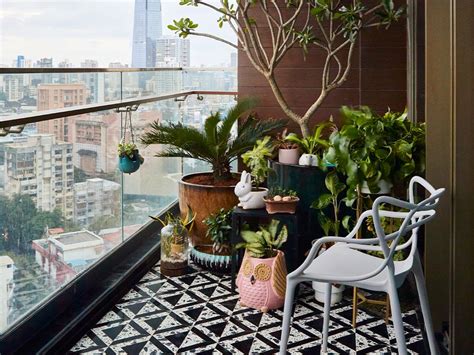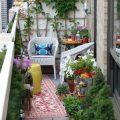Creative Balcony Plant Ideas for Year-Round Gardening
Gardening on a balcony is a delightful way to embrace nature, even in small spaces. Whether you are a beginner or a seasoned gardener, balcony plant ideas allow you to create a vibrant, lush environment throughout the year. Each season offers unique opportunities for creativity, from fragrant flowers in spring to resilient herbs in winter. This guide will help you design a seasonal garden, providing tips on plant selection, care, and aesthetic design for a functional and beautiful balcony garden.
Key Concepts
- Seasonal adaptability: Choosing plants that thrive in different weather conditions.
- Space optimization: Utilizing vertical space, containers, and tiered designs.
- Plant variety: Incorporating a mix of flowers, herbs, and perennials for year-round color and utility.
- Low-maintenance options: Selecting plants that require minimal care for beginner gardeners.
- Design aesthetics: Balancing colors, shapes, and textures for an eye-catching garden.
Historical Context
The idea of balcony gardening dates back to ancient civilizations, particularly in cities where space was limited. In urban areas, people found innovative ways to grow plants in containers on terraces or windowsills, allowing them to engage with nature. Over the years, balcony gardens have evolved, blending traditional plant selections with modern landscaping techniques to enhance small urban spaces.
Current State Analysis
Today, balcony gardening is more popular than ever due to the increasing number of people living in urban areas. With limited outdoor space, many turn to balconies as a way to nurture plants and enjoy nature. The accessibility of gardening tools, easy-to-grow plants, and online communities sharing plant care tips has made it easier for even novice gardeners to cultivate lush, seasonal balcony gardens. From using vertical gardening techniques to smart irrigation systems, balcony gardening has also become a space for experimentation and creativity.
Practical Applications
Spring
- Flowers: Pansies, tulips, and daffodils thrive in cool spring weather, providing bursts of color.
- Herbs: Mint, parsley, and chives start growing quickly and are perfect for culinary use.
- Tips: Use biodegradable pots for planting seeds early indoors, then transfer them to your balcony when the weather warms up.
Summer
- Flowers: Geraniums, petunias, and marigolds tolerate the heat and bloom profusely.
- Herbs: Basil, thyme, and rosemary grow well in sunny, warm conditions.
- Tips: Water your plants in the early morning to prevent the soil from drying out too quickly in the heat.
Fall
- Flowers: Chrysanthemums and asters can withstand cooler temperatures, adding fall hues to your garden.
- Herbs: Sage and oregano are hardy herbs that thrive in autumn.
- Tips: Consider using containers with good drainage to prevent water from sitting in the soil during rainy weather.
Winter
- Flowers: Poinsettias and winter jasmine bring vibrant colors despite the cold.
- Herbs: Thyme and rosemary can survive chilly conditions, providing fresh herbs throughout winter.
- Tips: Protect your plants by wrapping containers in bubble wrap or using frost covers during freezing nights.
Case Studies
| Balcony Garden Type | Plants Used | Design Features | Challenges & Solutions |
|---|---|---|---|
| Urban Minimalist Balcony | Succulents, herbs, and small shrubs | Vertical planters, minimal decor, compact pots | Watering schedule adjustment for drought-resistant plants |
| Colorful Balcony Garden | Annuals like petunias, daisies, marigolds | Bright pots, tiered shelving for plants | Ensuring adequate sunlight by rotating plants |
| Herb Balcony for Cooking | Basil, mint, thyme, rosemary | Raised containers, hanging planters | Pest control for herbs using natural repellents |
Stakeholder Analysis
Balcony gardeners, urban designers, and environmental advocates are key stakeholders in this space. Balcony gardening reduces urban heat islands, improves mental well-being, and can contribute to local biodiversity. Urban designers can incorporate more plant-friendly balcony spaces into residential buildings, while environmental advocates can promote balcony gardening as a way to foster a connection with nature and reduce carbon footprints.
Implementation Guidelines
To create a successful year-round balcony garden, follow these guidelines:
- Plan for each season: Choose a mix of plants that thrive during different times of the year.
- Optimize space: Use vertical garden structures and multi-tiered plant stands to maximize your balcony’s space.
- Focus on container choice: Ensure your containers have proper drainage and insulation to handle weather changes.
- Water smartly: Set up a drip irrigation system or self-watering pots for consistent moisture levels.
- Use natural fertilizers: Compost or organic fertilizers improve soil quality without harming the environment.
Ethical Considerations
When choosing plants, consider ethical practices like using locally sourced seeds, avoiding invasive species, and opting for organic fertilizers to reduce environmental harm. Ethical balcony gardening also involves water conservation, minimizing chemical use, and promoting native biodiversity in urban areas.
Limitations and Future Research
Balcony gardening faces limitations, particularly regarding space and climate conditions. Future research could explore advanced container gardening techniques, smart irrigation systems, and drought-resistant plants for urban areas with limited access to water. More studies are needed to analyze the long-term effects of balcony gardens on mental health, local ecosystems, and urban sustainability efforts.
Expert Commentary
Experts in urban gardening emphasize the benefits of creating a sustainable balcony garden as a way to bring nature into everyday life. With innovations in plant care, design, and eco-friendly practices, balcony gardening can be an effective way to improve urban living conditions. By continuously evolving our plant choices and gardening techniques, we can ensure that balcony gardens remain a thriving, seasonal oasis year-round.


